If you’re not well-versed in celestial events, then allow us to bring the good news that last weekend the Spring Equinox took place, a date to be celebrated as it heralds the end of winter. Hurrah! Sadly, however, it also marked the end of Convergence, a ten-day extravaganza that knocked the London live music scene off its axis for the third year running.
2016 saw the most diverse and adventurous Convergence line-up to date, boasting such extensive musical riches that you’d have needed at least two dozen pairs of ears, eyes and legs to fully do it justice. Unfortunately the Monitors only had access to a six-legged beast (comprised of Luke O’Dwyer, Zoe Cormier and Kier Wiater Carnihan) to unleash upon the festival, but that was still enough to catch such luminaries as Of Montreal, Colin Stetson, Dan Deacon and The Gaslamp Killer. Read on for tales of computer-busting bassoons, near fatal scooter accidents and fucking massive saxophones…
We were treated to a kaleidoscopic explosion from Of Montreal at Village Underground, one that sent shards of brilliantly multi-coloured light deep into the adoring audience’s minds.
Predominantly the work of Kevin Barnes, Of Montreal formed in 1996 and as such they are now crafty veterans of the live arena. Tonight’s performance proves to be a far more pared-down affair than previous Of Montreal gigs, which regularly feature multiple dancers, projections and costume changes. As a result, tonight’s set gains in focus but loses none of the freewheeling melodrama.
Barnes sings during tonight’s opener, ‘Bassem Sabry’: “I’ll never follow no kind of master’s voice”, which is fitting as musically Of Montreal throw a ton of different styles and references into a metaphorical washing machine; stick it on a high heat and let the magic happen. But rather than have the colours run together into one large generic pink sludge, they all remain bright and crystal clear.
Tracks from their shimmering back catalogue are pouted towards the audience with sheer class, from the filthy sex-funk of Skeletal Lamping’s ‘For Our Elegant Castle’ to the angular, dark new-wave of last year’s Aureate Gloom.
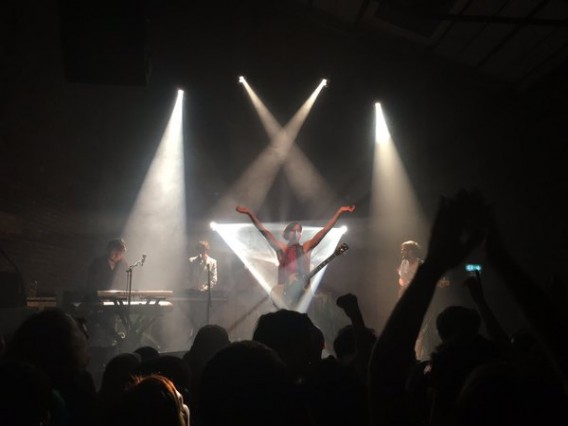
© honor louise
Kevin Barnes still brings the glam-sex-disco with more gusto than a herd of thrusting wannabes. Not many people can turn deep pain into such euphoric joy. Of Montreal’s music is a firework, and without Barnes burning fire there would be no light show. Tonight we’re all eating out of his rainbow-fingered hands. Luke O’Dwyer
Watching Colin Stetson perform has become something of an obsession for me, and luckily playing London seems to be something of an obsession for him – this is the sixth time he’s played the capital since we first met him at the tail end of 2013. This makes the Michigan-born musician a more frequent performer here than several British-based acts, and explains his humble thanks to the wild response from the crowd tonight, which sees him claim that London provides his most appreciative audiences. It could just be a classic touring musician platitude, but you get the sense he means it.
There’s no doubt he means it when he puts his instrument to his lips. If you’ve never seen Colin Stetson play live then be assured it’s like nothing you’ve ever witnessed before. Not only does he managed to produce up to three tones simultaneously – as well as percussion – using only his instrument and a selection of contact mics (most people wrongly assume that he uses looping pedals to produce his multi-layered sound – not true) but he does so with a gusto that takes him to the limit both musically and physically.
If that sounds intense then, well, it is. The sheer volume of the opening two tracks is something to behold, the Scala’s old walls shuddering as he belted out long, stentorian drones punctuated by guttural roars that resemble the death cries of some gigantic, wounded beast. There’s often a primal, animalistic fervour to his music that’s emphasised by the way he produces it, rocking back and forth while circular-breathing into his instrument with a force that looks almost painful, and that’s more the case tonight than ever.
While Colin Stetson’s last two visits have been alongside his violinist partner Sarah Neufeld (whose second solo record came out last week and well deserves a listen) to promote their collaborative Never Were The Way She Was album, tonight’s gig is notable for consisting almost entirely of non-recorded music. Stetson likes to ‘road test’ new material before taking it into the studio, making this performance a unique treat for return visitors.
He prefaces the last track of the set with a warning that we might get to see what it looks like “when a human being literally falls apart”, and the way he finally finishes the epic and volatile piece, wrenching himself away from his instrument in a cloud of spittle and exhaustion, suggests we very almost did. As the crowd clamours for an encore, my dad (who’s been to five of Stetson’s last six London gigs) remarks that it seems cruel to bring him back on after such a stamina-sapping performance.
His reappearance proves worth the effort though, consisting of one of his finest pieces, ‘A Dream of Water’ (without, obviously, Laurie Anderson’s spoken-word accompaniment). A shorter and more straightforwardly harmonic piece than those in the main set, its brevity also reassures us that we’re not about to see him keel over in front of us. It also stands out as more rounded against the newer material, which, while occasionally remarkable, does sometimes seem a little meandering and unfinished (a track previously debuted at his last London show, in contrast, stands out as feeling more complete). Stetson, for his part, seems to get a little lost inside them himself, admitting that a couple of the renditions went on for much longer than expected.
While the crowd’s reactions (including some ambitious dance moves from one punter) suggest that no one felt left behind, there’s a suspicion that this raw, elemental music will sound even better next time around. And the increasing size of the London venues Stetson is playing indicates that most people here will be around to find out… Kier Wiater Carnihan
I was way behind on my work (as always), but I took time out of my day to witness Dan Deacon in conversation with Mary Anne Hobbs. Time well spent.
Most electronic artists are clever. But not enough are funny.
If you want to unite abstract mathematical sonic art with philosophical wisdom, I suggest you make it funny. Laughter is medicine, and comedy is art. As my aunt put it exceedingly well, on all the arts a lover can express: “Funny trumps all.”
There is nothing intellectually deplete in making the audience laugh. And Deacon did so in the basement of the Ace Hotel (aka Hipster Mecca) with full force.
Choice cuts from Deacon’s lyrical waxing:
On Baltimore:
“I needed to be in a place where my job could be ‘unsuccessful musician’.”
On early adoption of samplers:
“I can’t wait to see how many layers of bassoon I can input before the computer crashes.”
On the weirdness of his music:
“I liked making unpleasant music.”
I laughed until I wept. And then – to my great shame – I tweeted. (I loathe Twitter and try to avoid it.)
Behold:

Joyful.
Deacon’s live gig later that night at the Village Underground was, true to form, just as grin-inducing and hilarious as his Q&A. As is his trademark, he whipped the audience around like a conductor directing a bodily orchestra. “Alright, I want everyone to get on either side of the room and leave a big space in the middle.” Dance-offs, competitive miming and much laughter ensued. Deacon’s shows always feature sweaty, chaotic, synchronised crowd antics.
“When you’re on the road playing the same set every night, the audience is the one thing that changes from night to night,” he had explained earlier that day. So why not see them as an instrument in itself?
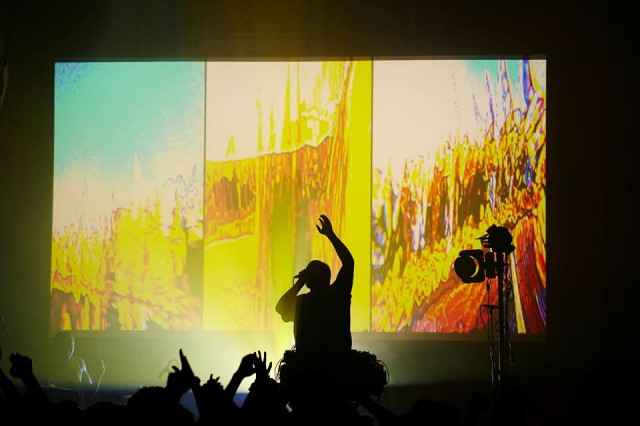
© Antonio Pagano
Anyone who’s found themselves pouring with sweat in a conga line in the street outside the actual venue will agree: he certainly succeeds. Zoe Cormier
William ‘The Gaslamp Killer’ Bensussen followed Dan Deacon at both Ace Hotel and (the following day) at Village Underground, but while their respective Q&As with Mary Anne Hobbs revealed some similarities (not least a mutual advocacy of the cultural importance, in an increasingly isolated age, of music’s power to bring people together), they differ in very key ways.
The interviews were guaranteed to be different, largely because while Hobbs hadn’t met Deacon before, she and Gaslamp Killer are old friends, which makes for a candid and surprisingly emotional chat. On the candid side, Bensussen talks openly about his early experiences with drugs and raving, and what he learned from a near-death experience following a brutal scooter accident – namely the North American medical system being as fucked as the recently departed (and not much missed) booking agency Elastic Artists (who expected him to recompense them for subsequently missed gigs), but more pertinently that his work-life equilibrium needed some drastic recalibration.
This seems to have resulted in an artist as enthused about music as ever – his tributes to Low End Theory, the influential LA club that he is a major part of, are rousing and heartfelt – but who dedicates equal energy to those around him. At one point Hobbs breaks off to reassure him what a great friend he is, and while it might have been the flu he caught after arriving in London, the comment seems to bring him close to tears. It’s not all sad though – there’s also a memorable anecdote about Grace Jones riding a stallion backstage at a festival, and Bensussen assures us that he’ll be giving his usual “110%” onstage despite the lurgy.
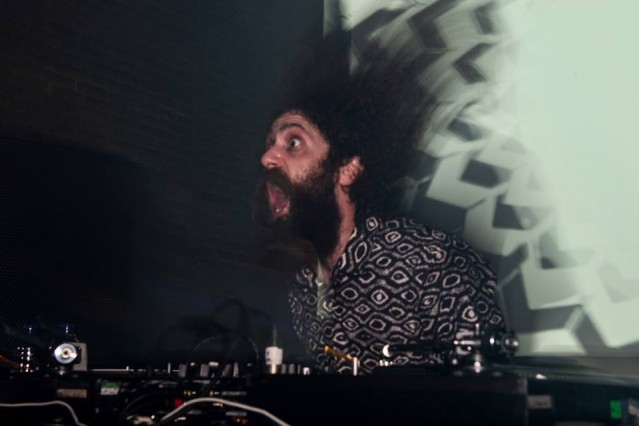
© Antonio Pagano
The strident, organ-led ‘Dead Vets’ is another highlight, adding some low-slung thrust to proceedings with a riff that reverberates through the building. It says something, though, that despite the latter part of the set consisting largely of unreleased material – usually a cue for a non-committed crowd to start losing focus – people stay pretty rapt. Like at the Colin Stetson gig, there are many Gaslamp Killer fans here who seem to feel positively privileged to witness new music being performed, rather than it being something to tolerate in between more recognisable tracks.
Convergence seems to attract this sort of music-lover in abundance, which is no doubt why it’s been such a welcome addition to London’s live music calendar. It’s an event that brings adventurous musicians to an adventurous audience, and that is truly a convergence to be celebrated.
Words: Kier Wiater Carnihan, Luke O’Dwyer and Zoe Cormier.
Of Montreal photos: Honor Louise
Dan Deacon and Gaslamp Killer photos: Antonio Pagano
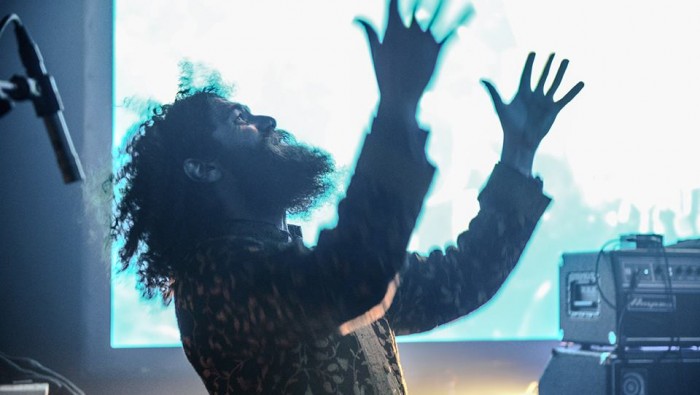
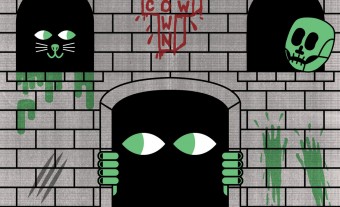

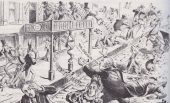
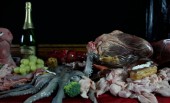

Follow us
Follow us on Facebook Follow us on Twitter Follow us on Google+ Subscribe our newsletter Add us to your feeds